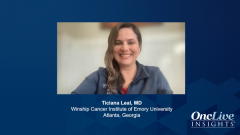
The Role of HER3 in Non–Small Cell Lung Cancer
A medical oncologist discusses the role of HER3 in the treatment of non–small cell lung cancer and provides an overview of the HERTHENA-Lung01 clinical trial.
Episodes in this series

This is a synopsis of an Insights series featuring Ticiana Leal, MD, of Winship Cancer Institute of Emory University, and Sandip P. Patel, MD, of UC San Diego Health Moores Cancer Center.
Associate Professor and Director of the Thoracic Medical Oncology Program at the Winship Cancer Institute of Emory University Ticiana Leal, MD and Professor of Medical Oncology at the University of California, San Diego Sandip P. Patel, MD discussed the role of HER3 targeting in epidermal growth factor receptor (EGFR) tyrosine kinase inhibitor (TKI) resistant non–small cell lung cancer (NSCLC).
Dr. Patel explained HER3 is part of the same family of protein kinases as EGFR. While small molecule EGFR TKIs have been successful for canonical activating mutations, HER3 represents a potential non-mutational bypass mechanism of resistance. The degree of HER3 expression varies across studies depending on cutoffs utilized, but seems present in a majority of NSCLC. Higher HER3 levels portend worse prognosis, including increased metastasis. Preclinical and translational data support combining anti-HER3 agents with EGFR TKIs may help overcome resistance.
Mechanistically, HER3 upregulation is typically at the protein rather than mutational level since HER3 possesses minimal kinase activity itself and relies on heterodimerization with partners like EGFR and HER2 to activate downstream signaling. Thus, surface protein depletion with an antibody-drug conjugate (ADC) represents an intriguing therapeutic tactic. Early phase trials of the anti-HER3 ADC patritumab deruxtecan, containing a topoisomerase I inhibitor similar to trastuzumab deruxtecan, have demonstrated promising clinical activity. Ongoing research aims to validate HER3 as a biomarker for therapeutic response to this ADC and optimize positioning in therapy sequencing.
Dr. Leal concurred HER3 upregulation is an emerging resistance bypass mechanism in EGFR mutated NSCLC warranting further exploration as both a prognostic marker and therapeutic target. Additional ADC approaches are also in development spotlighting this as an active area of drug development.
*Video synopsis is AI-generated and reviewed by OncLive editorial staff.






































